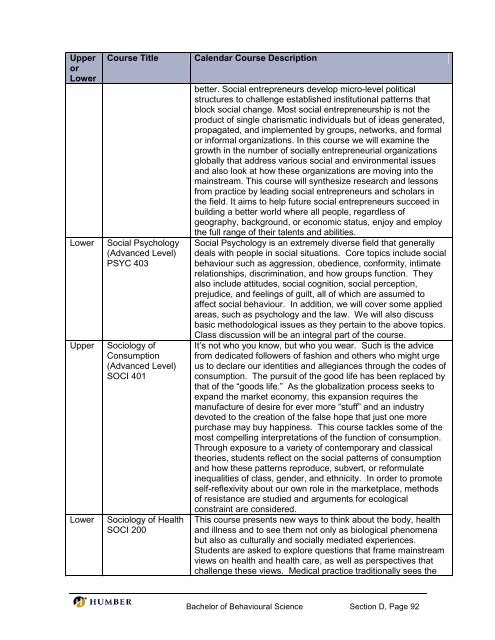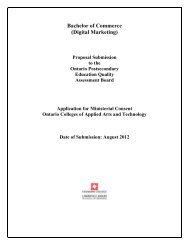Bachelor of Behavioural Science - Postsecondary Education Quality ...
Bachelor of Behavioural Science - Postsecondary Education Quality ...
Bachelor of Behavioural Science - Postsecondary Education Quality ...
You also want an ePaper? Increase the reach of your titles
YUMPU automatically turns print PDFs into web optimized ePapers that Google loves.
Upper<br />
or<br />
Lower<br />
Lower<br />
Upper<br />
Lower<br />
Course Title<br />
Social Psychology<br />
(Advanced Level)<br />
PSYC 403<br />
Sociology <strong>of</strong><br />
Consumption<br />
(Advanced Level)<br />
SOCI 401<br />
Sociology <strong>of</strong> Health<br />
SOCI 200<br />
Calendar Course Description<br />
better. Social entrepreneurs develop micro-level political<br />
structures to challenge established institutional patterns that<br />
block social change. Most social entrepreneurship is not the<br />
product <strong>of</strong> single charismatic individuals but <strong>of</strong> ideas generated,<br />
propagated, and implemented by groups, networks, and formal<br />
or informal organizations. In this course we will examine the<br />
growth in the number <strong>of</strong> socially entrepreneurial organizations<br />
globally that address various social and environmental issues<br />
and also look at how these organizations are moving into the<br />
mainstream. This course will synthesize research and lessons<br />
from practice by leading social entrepreneurs and scholars in<br />
the field. It aims to help future social entrepreneurs succeed in<br />
building a better world where all people, regardless <strong>of</strong><br />
geography, background, or economic status, enjoy and employ<br />
the full range <strong>of</strong> their talents and abilities.<br />
Social Psychology is an extremely diverse field that generally<br />
deals with people in social situations. Core topics include social<br />
behaviour such as aggression, obedience, conformity, intimate<br />
relationships, discrimination, and how groups function. They<br />
also include attitudes, social cognition, social perception,<br />
prejudice, and feelings <strong>of</strong> guilt, all <strong>of</strong> which are assumed to<br />
affect social behaviour. In addition, we will cover some applied<br />
areas, such as psychology and the law. We will also discuss<br />
basic methodological issues as they pertain to the above topics.<br />
Class discussion will be an integral part <strong>of</strong> the course.<br />
It‘s not who you know, but who you wear. Such is the advice<br />
from dedicated followers <strong>of</strong> fashion and others who might urge<br />
us to declare our identities and allegiances through the codes <strong>of</strong><br />
consumption. The pursuit <strong>of</strong> the good life has been replaced by<br />
that <strong>of</strong> the ―goods life.‖ As the globalization process seeks to<br />
expand the market economy, this expansion requires the<br />
manufacture <strong>of</strong> desire for ever more ―stuff‖ and an industry<br />
devoted to the creation <strong>of</strong> the false hope that just one more<br />
purchase may buy happiness. This course tackles some <strong>of</strong> the<br />
most compelling interpretations <strong>of</strong> the function <strong>of</strong> consumption.<br />
Through exposure to a variety <strong>of</strong> contemporary and classical<br />
theories, students reflect on the social patterns <strong>of</strong> consumption<br />
and how these patterns reproduce, subvert, or reformulate<br />
inequalities <strong>of</strong> class, gender, and ethnicity. In order to promote<br />
self-reflexivity about our own role in the marketplace, methods<br />
<strong>of</strong> resistance are studied and arguments for ecological<br />
constraint are considered.<br />
This course presents new ways to think about the body, health<br />
and illness and to see them not only as biological phenomena<br />
but also as culturally and socially mediated experiences.<br />
Students are asked to explore questions that frame mainstream<br />
views on health and health care, as well as perspectives that<br />
challenge these views. Medical practice traditionally sees the<br />
<strong>Bachelor</strong> <strong>of</strong> <strong>Behavioural</strong> <strong>Science</strong> Section D, Page 92
















